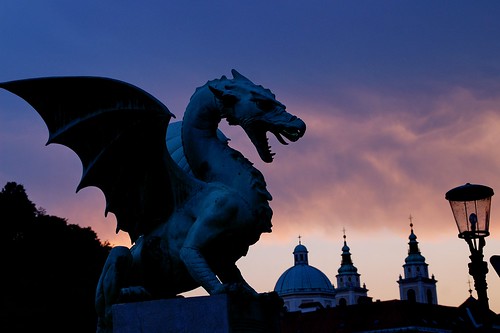On Legend
 Monday, September 12, 2016 at 11:43
Monday, September 12, 2016 at 11:43 Earlier on these pages I mentioned that "myth" was the favorite word of a famous actor; what I failed to add was the audience's reaction to such a pretense: the cooing and hollering so typical of the easily impressed. Kingsley's religious beliefs I cannot hope to know, and such a point bears no relevance on a discussion of the difference between his favorite word – sadly abused for over a century – and another, related term, that of "legend." As children, pupils, listeners, we come to associate terms that a more mature mind would cleave asunder; instead of learning at an early age the fine differences between vocabulary, we tend and are in fact pedagogically encouraged to list alleged synonyms as if they were eggs in a carton, all white, unbroken, and indistinguishable. Countless times as a schoolboy I found myself perplexed by this methodology. What good can it do us to know similarity if our world is founded on difference? What passion can be elicited from the average pupil by the average schoolmarm if we cannot take pleasure in separating our reality into its natural categories? Let us be clear: a myth is falsehood taken by the right gullible soul as historically true so that it then becomes a banner for our own mores; a legend is an exaggerated truth or plain fiction with a moral aspect, a glorification of what has already been accepted by the listener as worthwhile. This distinction and several others inform an essay in this collection.
 Legend, according to Belloc, serves the only need that we should ever consider, that of the spiritual (which may explain its earliest English meaning). Are we amazed by mystery and incomplete knowledge of the world and thus prone to flights of fancy? No, we are simply spirituals who must rekindle the imaginings that allow us to glimpse something beyond what our five dull senses might perceive:
Legend, according to Belloc, serves the only need that we should ever consider, that of the spiritual (which may explain its earliest English meaning). Are we amazed by mystery and incomplete knowledge of the world and thus prone to flights of fancy? No, we are simply spirituals who must rekindle the imaginings that allow us to glimpse something beyond what our five dull senses might perceive:
It is in the essence of Legend that its historical value is not in question. It has not to be believed as witness to an event but as example; or even as no more than a picture which does us good by its beauty alone. We are not, in using legend, affirming a belief in a particular occurrence, but listening with profit to a story; and if the moral of the story is sound – if its effect is towards truth, goodness, beauty – that is all we ask of it.
There then follows a nice example of legend deprived: an "inhuman child" does not absorb this children's tale and dream of courage, but rather requests that the Giant's Castle be located "on the ordnance map." Why would a child ever think of committing such folly, given that he is supposed to know what he hears may not and indeed probably could never be true? Because that child is no tyro, but an incredulous adult who from arrogance's throne has decided that anything that his senses cannot pick up is a sham. Now when I heard the tale of Saint George and the Dragon as a child, I immediately sensed that I was listening to fiction; not because, as it were, dragons could not or did not exist; but because the tale itself was too clean, too buttressed by stylistic accretions to resemble the news reports I watched every night on television (my parents, at one point at least, used to love television news). I then learned that dragons, if that's really the right term for them and if they weren't simply this beast, died with all the fantastic creatures in a child's universe because of snow, lots of snow. There still lurks somewhere in the snowy plains of my imagination a slow-falling and gigantic lizard crumbling beneath its incapacity to survive in cold climates. Whence comes that image, or whether it isn't a montage of many memories, is what is meant by legend.
Belloc also touches upon this hallowed site, believes its fame to be perfectly plausible, and then adjoins one final phrase: "I am sure I appear absurd when I say that I believe this legend to contain historical truth." Historical truth is, mind you, not what can be proven through empirical testing – ultimately, almost nothing, since not having been there can stand as proof alone of its impossibility – but what gilds logic according to our sensibilities, not just our senses. Surely it is sensible to think that creatures like us came from other, less evolved creatures, but where we all emerged from is a black hole of knowledge that has been explained away, at least for now, with some preposterous theory of combustion and explosion that is more mythic and nonsensical than any miracle or divine interference. A basic law of physics is that you cannot get something for nothing – but we were, apparently, uncreated and therefore at one time nothing. To remind us of these past lives we have forged the annals to delude the stupid into believing in grace and providence, all the while concealing the truth: that those dragons are nothing more than an amalgamation of birds and snakes, our two tree-bound enemies, and that we are monkeys who have become something more than monkeys. Again, evolution has its merits and it is perfectly logical according to our senses, our actions, and our physical instincts of survival. But to say it completely explains our provenance is a little like saying sharks explain the pelagic food chain or kangaroos explain Australia. In other words, we have a species but not a world, existence without origin, and effect without cause – the last of which will not make the modern scientific mind particularly happy.
We have come a long way from myths and legends. Now we know nearly everything there is to know about our world and have invested an indefinite amount of money into exploring others. Millions of years ago, chants a chorus of men of science, beasts walked the earth whose bones we still have and whose shapes we can reconstruct owing to our utter brilliance in reconstructing the past, predicting the future, and discarding the present in favor of both. These men of science, as learned as they might claim to be despite the fact that they are inevitably destined to be contradicted and exposed by the following generation, will then talk of ice ages, asteroids, and other events that are quite probable but completely and utterly unprovable. They will sneer at any talk of supernatural events, although any fifteenth-century person claiming dinosaurs once roamed the earth would forcibly attribute such an occurrence to powers beyond that of mankind. But something is bothersome about all their formulas, fossils, and filibusters: there is no accountability. The myth itself, if that is the right word, has come and not quite gone until another, better myth has been substituted:
But if there enter into the controversy side issues which have logically nothing to do with it, if the controversy arouses passions on matters which the reason should see to be quite distinct from the original statement, then at once the breeding soil for Myth, the atmosphere favorable for its growth, has appeared. So that the next stage is the prodigious advance in strength and wide dispersion of the false statement; it is, so to speak, mobilized and armed, and goes out to battle on a large scale.
You may have heard of these battles; they are still being waged by those who believe in nothing except stars they can barely discern and animals whose lifetimes cannot be quantified. They believe that we owe each other nothing because we are but links on an endless chain of death, an assembly line to build a perfect beast that will ultimately develop the capacity to obliterate itself. Once upon a time we were amoebae – that is their legend, myth, and holy scripture. But an alternative prevails upon the spirit during hard times – even occasionally, I suspect, on theirs – and indicates another path, a golden road which may look like the plainest soil but which ascends gradually to a higher level of what we believe and what we have taught ourselves to think. And there we may find the greatest legend of them all to be something more than that.
 Belloc in
Belloc in  English literature and film,
English literature and film,  Essays
Essays 



